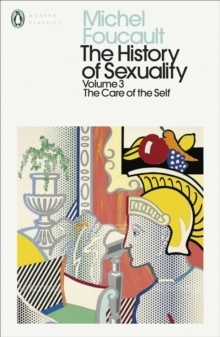The Care Of The Self
The History Of Sexuality Vol.3

Editorial Dorling Kindersley
Fecha de edición abril 2020
Idioma inglés
EAN 9780241386002
Libro
encuadernado en tapa blanda
Resumen del libro
Bristles with provocative insights into the tangled liaisons of sex and self' Times Higher EducationIn the third volume of his acclaimed examination of sexuality in modern Western society, Foucault investigates the Golden Age of Rome to reveal a decisive break from the classical Greek version of sexual pleasure. Exploring the moral reflections of philosophers and physicians of the era, he identifies a growing anxiety over sexual activity and its consequences. At the core of this transformation Foucault found the principles of the 'care of the self': the belief that the self is an object of knowledge to be cultivated over time, and the implications this has for ethics and behaviour.
Biografía del autor
Michel Foucault (Poiters, 1926 x{0026} x02013; París, 1984), filósofo, historiador y sociólogo francés, fue profesor en numerosas universidades tanto francesas como internacionales. En 1970 la asamblea general de profesores del Collège de France le concedió la titularidad de la cátedra Historia de los sistemas de pensamiento, que ocupó hasta su muerte.<br> Hijo de un eminente cirujano de la zona de Vichy, Foucault no destacó en los estudios hasta llegar a la École Normale Supérieure, paso previo para acceder a la Universidad, donde cursó filosofía y psicología. No obstante acabó doctorándose y convirtiéndose en el autor más citado del mundo en el ámbito de humanidades de 2007, según The Times Higher Education Guide.<br> En 1966 publica Les Mots et les choses, uno de sus más importantes aportaciones al estructuralismo junto a Jacques Lacan, Claude Lévi-Strauss y Roland Barthes.<br> Michel Foucault es autor, entre otros libros, de Historia de la locura, Vigilar y castigar, Historia de la sexualidad x{0026} x02014;de la cual tan sólo concluyó 3 volúmenesx{0026} x02014;, Enfermedad mental y personalidad, Enfermedad mental y psicología, Discurso y verdad en la antigua Grecia, Obras esenciales y De lenguaje y literatura, los cinco últimos publicados por Paidós.








